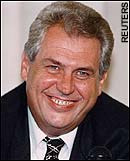|
Our country will cease to exist
in EU, Czechs told
By Kate Connolly
in Berlin
(Filed: 23/04/2004)
President Vaclav Klaus of the Czech Republic told his
country yesterday that it would "cease to exist as an independent
and sovereign entity" the moment it joined
the European Union in a week's time.
Mr Klaus, who has sought to foster a reputation as a
Eurosceptic in the Thatcher mould, issued the warning in an article
in the country's largest newspaper, Mlada Fronta Dnes.
| |
 |
|
President Vaclav Klaus |
He wrote that if the Czechs and the nine other
countries joining the EU a week tomorrow did not press for their
rights, they would struggle in the enlarged 25-member
organisation.
"As everyone is well aware, in a few days our state
will cease to exist as an independent and sovereign entity," he
said.
"We must do everything we can so that our unique
existence over 1,000 years will not crumble and be lost."
In his article, headlined "Let's not get lost in the
EU", Mr Klaus acknowledged that the union had its positive points.
He praised it for its contribution to ending the divisions in Europe
and said it had increased trade and employment mobility.
But he argued that it had pressed for integration too
quickly, posing an "important risk" and endangering the
individualism of each member country, which he said would lead to
conflict. He called on Czechs to brace themselves for the changes
and to prevent the "work of our forebears from being diluted".
He said: "I wish all of our citizens energy, courage,
self-confidence and optimism. We will need it more than ever."
The majority of Czechs support EU membership, though
there is little enthusiasm for it, largely because the government
has introduced cost-cutting measures to the social system to bolster
the country for the tougher economic pressures ahead.
A recent study by the University of Michigan showed
that, of all the new EU members, economic growth in the Czech
Republic is the lowest and living standards are among the
lowest.
Lack of innovation and poor education levels are said
to be to blame in a country where less than 12 per cent of the
working population has a degree - compared with 17 per cent in
Hungary, for example - and where worker productivity is only about
55 per cent of the EU average.
Many of Mr Klaus's opponents blame him for the
country's indifferent economic performance. He was the finance
minister from 1989-92 and the prime minister from 1992-7.
He replaced
Vaclav Havel as president last year. The dissident playwright
was Mr Klaus's most prominent opponent, accusing him as prime
minister of allowing corruption and illegality to flourish.
Mr Klaus, who has largely dominated Czech political
life since the fall of communism, is best known as the author of an
unsuccessful post-communist reform programme.
Despite his admiration for Lady Thatcher, he failed
to follow her example, blocking foreign capital from entering the
country and refusing to privatise banks.
When a referendum was held last June on whether the
Czech Republic should join the EU, he was criticised for refusing to
give voters any guidance, although 77 per cent of them were in
favour.
Previous story: Tighter
security cuts US tourism by 30pc
Next story: Sebastopol
prepares to honour Crimean dead
|


![]()